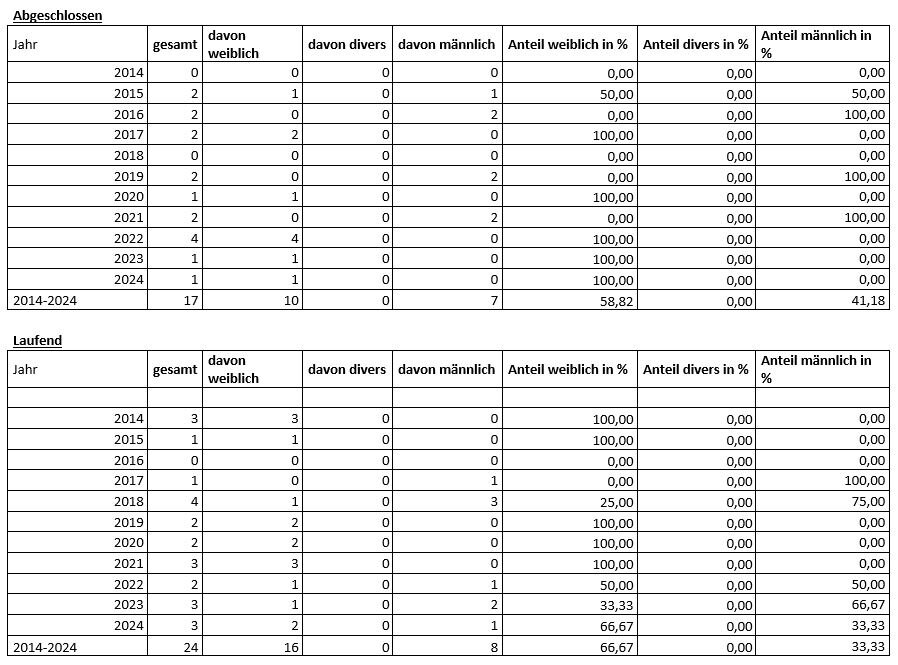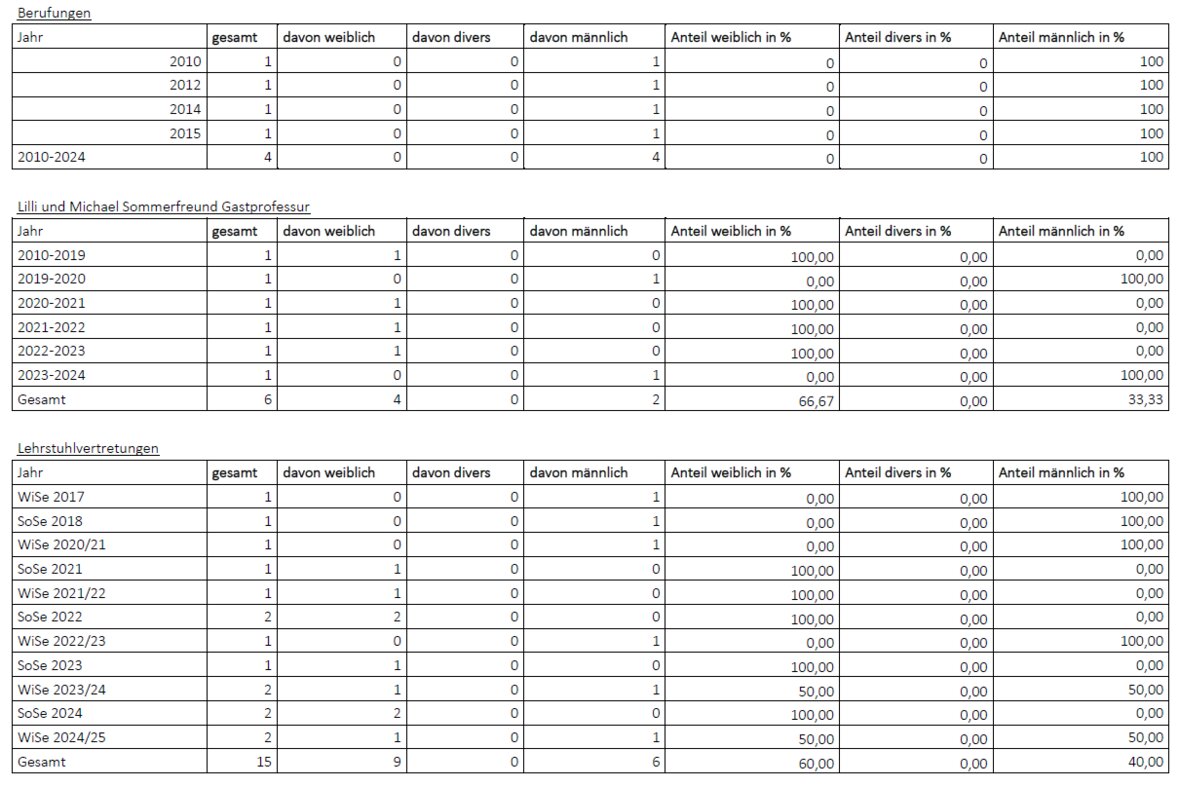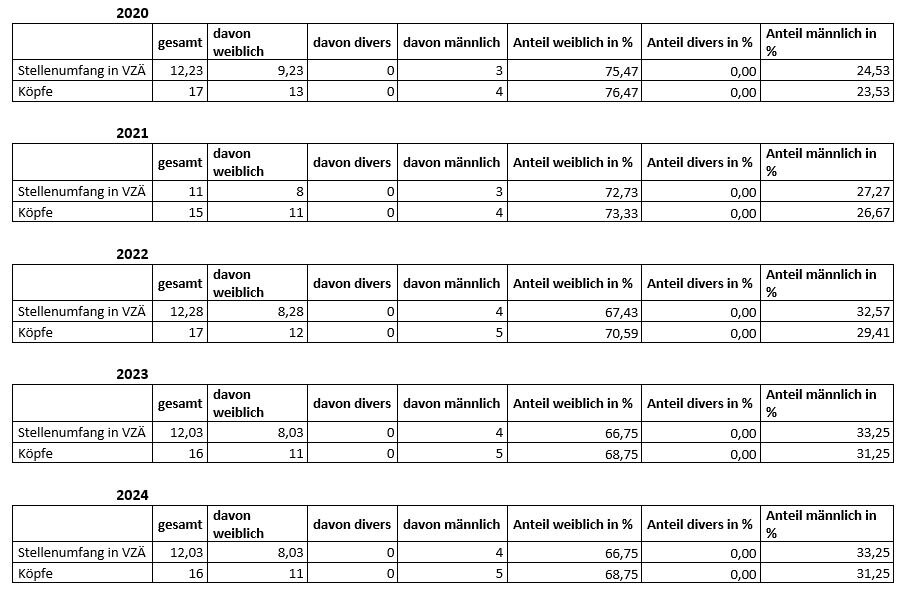Gender Equality Plan of the University
According to Article 3 (2) of our Basic Law, men and women have equal rights. In implementing this constitutional requirement, universities are obliged to promote the actual implementation of equal rights for women and men and to eliminate any existing disadvantages.
The Gender Equality Plan is one of the central instruments for promoting gender equality and a better work-life balance for women and men. The Heidelberg University of Jewish Studies (HfJS) also sees itself as an open-minded place of learning, teaching and working in general. It is therefore a declared goal to raise the awareness of all university members for the various categories of inequality, to create an overall diversity-sensitive and appreciative environment across all status groups and, if necessary, to develop measures to prevent discrimination and exclusion of any kind.
The Heidelberg University of Jewish Studies sees the realization of gender equality as a central cross-sectional task that affects every area of work. For the university, equality means the realization of a university environment free of discrimination and the creation of equal opportunities regardless of gender, nationality, ethnic and social origin, religion, ideology, age and sexual orientation.
The university's equality plan was adopted by the Rector on March 6, 2025. It is regularly updated by the Rector in cooperation with the Equal Opportunities Officer.
The equality plan contains an analysis of the current situation, from which goals and measures for the realization of equal rights were derived and which are to be implemented in the coming years.
Contents
1. Studies/Students
2. Academic staff
3. Doctorates
4. Appointments and appointments to professorships
5. Non-academic employees in administration and support areas
6. Gender-sensitive communication
7. Personnel development
8. Compatibility of studies or career and family
9. Measures against gender-based violence including sexualized harassment and violence
10. Responsibility, reporting obligations, publication and entry into force
1.2 Goals
In view of the predominance of women among students, female students are sufficiently represented.
1.3 Measures
However, it should be noted that the proportion of women is decreasing. The university is monitoring this trend and will take countermeasures in good time if necessary, such as increased advertising of degree courses to potential female students.
2. Academic staff
2.1 Inventory and analysis
Women are sufficiently represented among academic staff. There is no discrimination.
2.2 Goals
The HfJS aims to achieve a 50% share of female academic staff in FTE.
2.3 Measures
To achieve this goal, the professors should be made aware that female academic staff are underrepresented and should be given preference if equally qualified. Suitable female students should be encouraged to apply for research assistant positions towards the end of their studies.
In addition, vacant positions are always advertised and the requirements of the AGG are implemented. The advertisement does not contain any gender-specific restrictions.
The application documents are checked using transparent and gender-neutral assessment criteria. Documentation of this is recommended.
The committee for the selection interviews should be made up of equal numbers of men and women wherever possible and should be gender-competent.
The entire procedure should be characterized by respectful and continuous communication with all applicants.
Many academic staff are employed part-time. They should therefore be informed that they have the same opportunities to participate in training courses as full-time employees. Employees are released from work to take part in training courses and their travel and participation costs are covered.
When projects are extended, it must always be checked whether the employees can be taken on.
3. Promotions since 2014
3.1 Inventory and analysis
Women are sufficiently represented in both completed and ongoing doctoral procedures. There is no discrimination.
3.2 Goals
The aim is to maintain this positive result.
3.3 Measures
No measures are currently required. The university will review the figures regularly and react immediately if the trend is downward.
4. Appointments and appointments to professorships
4.1 Inventory and analysis
The proportion of women among the appointments is 0%, whereas the Lilli and Michael visiting professorships are predominantly held by women (66.65%) and the professorships are held by women (59.4%).
4.2 Goals
The aim is to significantly increase the proportion of women in appointments.
4.3 Measures
The measures cover all phases of the appointment procedure. However, the advertisement process plays a particularly important role. Here, care is taken to ensure that there are no gender-specific restrictions and that people of all genders feel addressed. It is also expressly pointed out that applications from women are particularly welcome. In addition, the members of the appointment or selection committee should be gender-competent and the committee should be made up of equal numbers of men and women wherever possible. At the beginning of the appointment procedure, an analysis should be carried out with the aim of identifying qualified women and informing them specifically about the vacancy. Professorships and deputy professorships should be awarded to women as far as possible. Gender competencies for teaching, studies and further education should be anchored in the profiles and job advertisements. The appointment procedure should ensure respectful and continuous communication with all applicants. The assessment criteria for the application documents should be formulated in a transparent and gender-neutral manner.
5. Non-scientific employees in administration and support areas
5.1 Inventory and analysis (reference date 01.12.)
Women are sufficiently represented among non-scientific employees. There is no discrimination.
5.2. Objectives
The aim is to maintain this positive result.
5.3 Measures
Vacant positions are always advertised. Care is taken in the job advertisements to ensure that they do not contain any gender-specific restrictions and that people of any gender feel addressed. It is also expressly pointed out that applications from women are particularly welcome. The positions are also advertised on a part-time basis, provided there are no compelling official interests to the contrary. The requirements of the AGG are observed and implemented in the selection process. This means that female applicants with equivalent suitability, aptitude and professional performance will be given preferential consideration, unless reasons relating to the person of a competitor prevail. In addition, the selection committee for the selection interviews should be made up of equal numbers of men and women wherever possible and should be gender-competent. The entire process should be characterized by respectful and continuous communication with all applicants.
Regular appraisal interviews are held for all employees in the administration department. These offer both the opportunity to express the desire for personal development and the opportunity for the university to find out about these wishes and to identify the resources and potential of individual employees, to keep an eye on them and to promote and enable further development. Heidelberg University and other external providers of further training are available for this purpose. Part-time employees have the same opportunities to participate in training as full-time employees. They are released from work to take part in training courses and their travel and participation costs are covered.
6. Gender-sensitive communication
The university strives to use gender-sensitive language in its internal and external communication, thereby promoting awareness. Various forms of gender-sensitive language are used by employees: in addition to gender-neutral terms, the feminine and masculine forms of language, the so-called gender asterisk (*) and the gender colon are used. The university strives to establish gender-sensitive language that takes account of a person's social gender. The aim is to present men, women, trans*persons and inter*persons in their diversity of gender identities appropriately and equally.
7. Staff development
The aim of the university is to provide all employees with equal opportunities for professional development and participation in training events. Employees have the opportunity to take part in training courses offered by Heidelberg University and external providers.
Part-time employees have the same opportunities to participate in further training as full-time employees.
The university strives to promote gender competence among its employees. In order to achieve this, they can and should complete further training that aims to develop and/or expand gender competence and sensitize them to gender-specific issues.
8. Compatibility of studies or career and family
8.1 Compatibility of studies and family
The university supports students who are caring for and raising children so that they can complete their studies as smoothly as possible despite the accompanying family challenges. To this end, students with children can take advantage of the services offered by Heidelberg University to reconcile studying and family life.
Courses at the university generally take place at family-friendly times.
In addition, the Master of Education course can be completed part-time. This option will be extended to other degree courses.
8.2 Compatibility of career and family
The university offers a wide range of individual opportunities that make it easier for employees to reconcile work and family life.
The university has set itself the goal of further strengthening the compatibility of family and career. To this end, the existing options are constantly reviewed and further developed. In addition, individual solutions are implemented where necessary and possible.
Numerous measures are taken to improve the compatibility of work and family life.
Part-time work is made possible in all areas of responsibility. The aim is to align employees' working hours with their individual needs within the scope of what is legally possible.
All part-time employees are given the same career advancement and training opportunities as full-time employees. Periods of childcare, family work and part-time employment are not considered a disadvantage when assessing qualifications.
The university strongly supports the use of parental leave and leave for family work by male employees as well.
Since the outbreak of the coronavirus pandemic, all employees whose work organization allows it have been able to work remotely once a week, which has further improved the compatibility of work and family life.
Committee meetings and regular meetings are organized in a family-friendly manner and, where possible, take place during working hours when part-time employees are also present. The individually agreed part-time working hours are also taken into account when arranging short-term appointments for tasks or projects within the individual departments.
9. Measures against gender-based violence, including sexualized harassment and violence
Finally, it is of paramount importance for the university to ensure a working environment in which everyone feels safe. This means, among other things, providing tools to combat gender-based violence and, in particular, sexual harassment.
According to § 3 para. 4 AGG, sexual harassment occurs when unwanted, sexually oriented behavior, including unwanted sexual acts and requests for these, sexually oriented physical touching, remarks of a sexual nature and the unwanted display and visible attachment of pornographic images, has the purpose or effect of violating the dignity of the person concerned, in particular when an environment characterized by intimidation, hostility, humiliation, degradation or insults is created.
The university should be a safe and non-violent place to study, teach and work, where no forms of sexualized harassment, discrimination and violence are tolerated. To this end, the following measures are taken:
The university management ensures that supervisors and other responsible persons are informed of their obligations to protect employees and students and fulfill these obligations. On March 5, 2025, the University Senate adopted the Senate Guideline on Conduct in Partnership, with which the university ensures equal and respectful treatment of its members and staff at all functional levels. All members and employees of the university, especially those with teaching and management responsibilities, must take appropriate measures in their area of work to ensure that sexually discriminatory behavior, harassment and violence do not occur. Within the scope of their responsibilities, they are obliged to follow up on any reports, take concrete measures and make full use of their legal and actual possibilities.
Contact points for help in the event of sexualized harassment and violence are the respective supervisor of the person concerned and the contact person for sexual harassment and anti-discrimination. In addition, supervisors and victims can also contact the Equal Opportunities Officer. Affected students can also contact the university's Equal Opportunities Officer and the contact person for sexual harassment and anti-discrimination.
10. Final provisions
The Gender Equality Plan comes into force after its publication on the homepage.
Dr. Andreas Brämer
Rector of the HfJS







